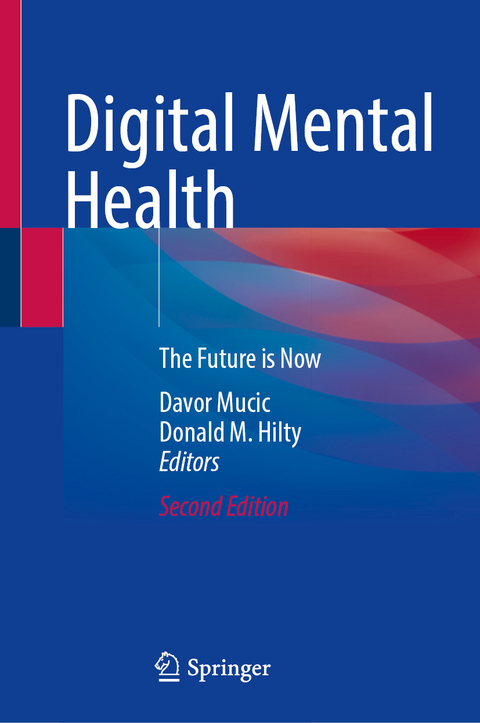
Digital Mental Health
Springer International Publishing (Verlag)
978-3-031-59935-4 (ISBN)
- Noch nicht erschienen - erscheint am 02.03.2025
- Versandkostenfrei innerhalb Deutschlands
- Auch auf Rechnung
- Verfügbarkeit in der Filiale vor Ort prüfen
- Artikel merken
The previous 2016 edition, "E-Mental Health," shed light on the application of telecommunications technologies to deliver mental health services remotely to people in often underserved locations due to geographic distance, and cultural or language differences.
This new edition on "Digital mental health" represents a similar concept as e-mental health. However, the paradigm has changed; underserved populations are no longer the exclusive focus. The experience of the COVID-19 pandemic has encouraged wider acceptance and application of the technology, expanding its use to both rural and urban areas.
The expansive potential of digital mental health approaches is demonstrated in a variety of mental health contexts, highlighted through clinical examples and applications that introduce innovative strategies for technology integration. Moreover, the book outlines a framework for global cooperation, with the goal of cross-border exchange of expertise and knowledge. This booktargets a broad audience, including mental health practitioners, medical and nursing students, academic researchers, technology experts, and health policymakers.
TBA update Davor Mucic, M.D. is an educated psychiatrist in Denmark. He established the Little Prince Psychiatric Center for refugees and migrants. This Center has been a pioneer in developing telepsychiatry in Denmark since 2000. In 2011 Davor Mucic launched a Telemental Health Section within European Psychiatric Association (EPA). He is also member of the Danish Psychiatric Association, World Psychiatric Association (WPA), World Association of Cultural Psychiatry (WACP) and American Telemedicine Association (ATA) and works as an Editor for the Edorium Journal of Psychiatry. Donald M. Hilty, M.D. is a scholar in psychiatric and medical education, mood disorders, technology applied to clinical practice, and in mentoring of trainees at the Keck School of Medicine, University of California and Los Angeles County. His research involves health services, consultation-liaison models of care, medical education, mood disorders and genomics in underserved medical populations. Dr. Hilty has authored over 140 articles, chapters, book reviews, and/or books. He has participated in over 100 peer-reviewed presentations as a member of the Association for Academic Psychiatry (AAP), the Academy for Psychosomatic Medicine, the American Telemedicine Association (ATA), and the American Psychiatric Association (APA).
Part I : Introduction.- 1. Technology, Health, and Contemporary Practice: How Does Digital Mental Health Fit It and What Does It Offer?.- 2. Entangled in the Web. Unexpected Events with New Technologies: Safety Issues, Addiction, and Consequences on Communication.- 3. Information Technology For Behavioral Health: Global Perspectives On Access, Services And Stigmatization.- 4. Detection, Evaluation And Best Practices For Technology-Based Fatigue To Promote Well-Being.- Part II : Access, Evaluation, User Design.- 5. Designing new technology for neuro developmental disorders and the importance of involving users (not only robots).- 6. Digital Mental Health Improves Access To Care, Facilitates Early Intervention, And Provides Evidence-Based Treatments At A Distance.- 7. How To Build, Evaluate and Increase Your Telemental Health Program Efficiency.- 8. Digital Mental Health Toward Cross-Cultural Populations Worldwide.- Part III : Integrating Technology Into The Clinical Practice.- 9. Telepsychiatry: From "Telepathy" To The Mainstream.- 10. How Digital Mental Health Adds To Traditional Outpatient And Newer Models Of Integrated Care For Patients, Providers, And Systems.- 11. Social Media And Clinical Practice: What Stays The Same, What Changes And How To Plan Ahead?.- Part IV : Updates On Patient Centered Digital Mental Health Treatments.- 12. Web- and Internet-Based Services: Education, Support, Self-Care, Formal and Hybrid Treatment Approaches.- 13. Artificial Intelligence And Predictive Modeling In Mental Health.- 14. Cognitive Behavioural Therapy and Cognitive Bias Modification in Internet-Based Interventions for Mood, Anxiety and Substance Use Disorders.- 15. Internet-Delivered Psychodynamic Therapy in Psychiatric Disorders.- 16. Psychiatric Apps: Patient Self-Assessment, Communication, and Potential Treatment Interventions.- Part V : Perspectives on Technology, Healthcare and Life.- 17. Advancing Mental Health Care: Global Perspectives On Digital And Telepsychiatry Solutions.- 18. How Does the Internet Influence the Doctor-Patient Relationship?.- 19. Lessons Learned or Forgotten? Future Direction of Global Digital Mental Health Care.
| Erscheint lt. Verlag | 2.3.2025 |
|---|---|
| Zusatzinfo | III, 461 p. 35 illus., 34 illus. in color. |
| Verlagsort | Cham |
| Sprache | englisch |
| Maße | 155 x 235 mm |
| Themenwelt | Geisteswissenschaften ► Psychologie |
| Medizin / Pharmazie ► Medizinische Fachgebiete ► Psychiatrie / Psychotherapie | |
| Schlagworte | Cross cultural • pathological use of internet • Patient satisfaction • prevention • Stigma • Telepsychiatry • web based approaches i.e. iCBT |
| ISBN-10 | 3-031-59935-7 / 3031599357 |
| ISBN-13 | 978-3-031-59935-4 / 9783031599354 |
| Zustand | Neuware |
| Informationen gemäß Produktsicherheitsverordnung (GPSR) | |
| Haben Sie eine Frage zum Produkt? |
aus dem Bereich


